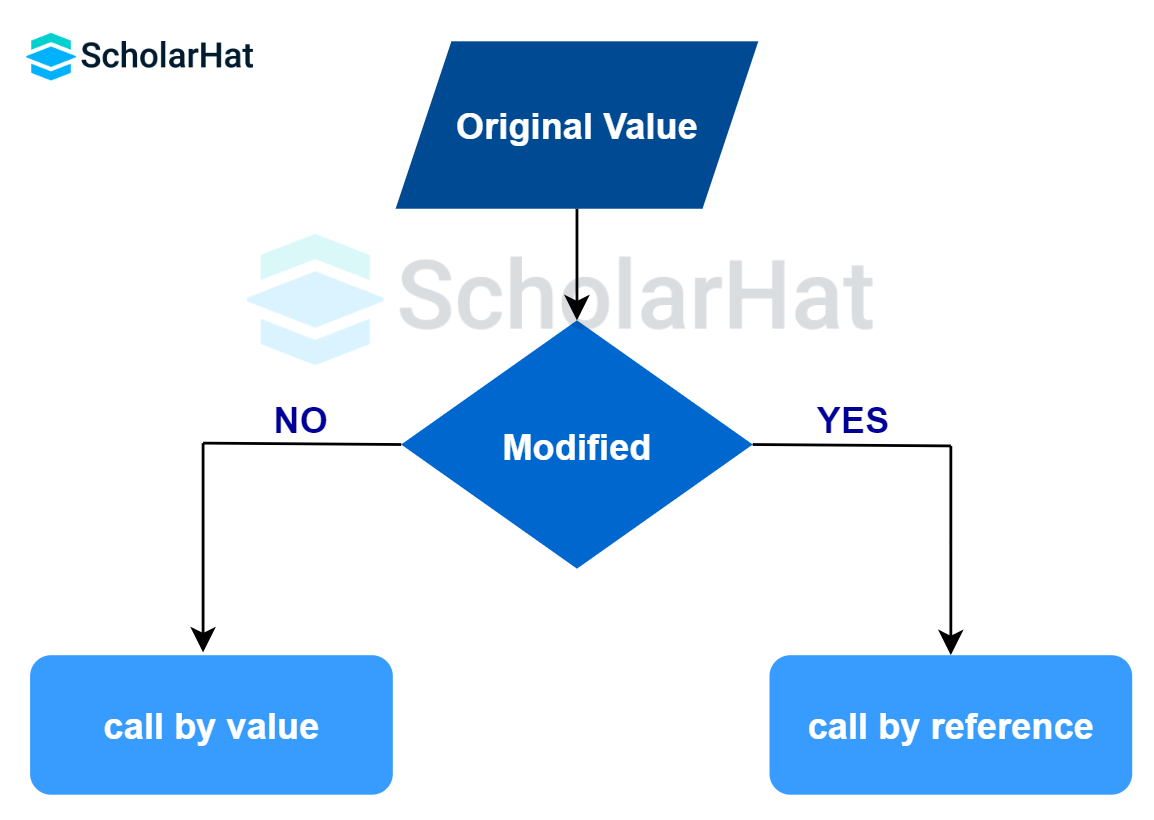Call By Value and Call by Reference in C#
Call By Value and Call by Reference in C#: An Overview
In C#, understanding the concepts of 'Call By Value' and 'Call By Reference' is crucial for effective parameter handling. This article delves into these fundamental mechanisms, explaining how values and references are passed to methods, and the impact they have on program behavior and data manipulation.

Read More - C# Interview Questions For Freshers
What is Call by Value in C#?
In C#, Call By Value refers to the method of passing parameters where the value of the variable is copied, and any changes made within the method do not affect the original variable outside the method. It ensures data integrity and prevents unintended modifications of the original variable.
Understanding Call By Value in C#
- Value Copy: When a variable is passed to a method, its value is copied into the parameter of the method.
- Data Integrity: Changes made to the parameter inside the method don't affect the original variable outside the method.
- Primitive Types: Value types like int, float, char, etc., are passed by value by default.
- Immutable: Ensures that the original data remains unchanged, making it a safe way to pass data to methods without altering the original value.
- Predictable: Provides clear understanding and control over data manipulation, ensuring no unexpected side effects.
Advantages of Call By Value in C#:
- Predictability: Call By Value ensures that methods cannot modify the original data, making code behavior more predictable and manageable.
- Safety: Original values remain intact, preventing unintended changes, and enhancing program stability.
- Isolation: Method execution occurs in isolation, safeguarding data integrity and avoiding unintended side effects.
- Clear Logic: Easier debugging and understanding of code flow, as values passed into methods are explicitly defined and don't change unexpectedly.
- Immutable: Immutability ensures the integrity of variables, promoting a robust and secure coding environment.
Disadvantages of Call by Value in C#:
- Performance Overhead: Copying large data structures can be resource-intensive, impacting performance, especially in functions with frequent calls.
- Memory Usage: Call by value requires additional memory to store copied values, leading to increased memory usage, especially with complex objects.
- Limited Modifications: Changes made to the copied values inside the method don't reflect back to the original, limiting the ability to modify variables directly.
- Not Suitable for Large Objects: Passing large objects by value can cause memory allocation issues and slowdowns due to copying large chunks of data.
Examples of Call By Value in C#
using System;
class Program
{
static void Increment(int number)
{
number++;
Console.WriteLine("Inside Increment method: " + number);
}
static void Main()
{
int value = 10;
Console.WriteLine("Before calling Increment method: " + value);
Increment(value);
Console.WriteLine("After calling Increment method: " + value);
}
}
Explanation
This C# code in the C# Compiler defines a program with a Main method and an Increment method. It initializes an integer variable 'value' to 10, prints its value, and calls the Increment method with 'value' as an argument, which increments it locally but doesn't affect the original value, as integers are passed by value. The program prints the 'value' again, showing it remains unchanged outside the Increment method.
Output
Before calling Increment method: 10
Inside Increment method: 11
After calling Increment method: 10What is Call by Reference in C#?
In C#, Call By Reference involves passing the memory address (reference) of a variable to a method, allowing direct access and modification of the original data. Changes made within the method persist outside, enabling more dynamic and flexible data manipulation in programs.
Understanding Call By Reference in C#
- Reference Passing: In C#, when a method is called with a reference type parameter, it passes the reference (memory address) of the variable, not the actual value.
- Modifying Original Data: Since the method receives the memory address, any changes made to the parameter inside the method affect the original data outside the method.
- Out and Ref Keywords: Parameters can be explicitly marked with ref or out keywords, allowing the method to modify the variable they refer to, even before it's assigned a value inside the method in the case of out.
- Use Cases: Call By Reference is often used when a method needs to return multiple values or modify the state of an object, providing a way to manipulate data directly.
- Pointer-Like Behavior: While C# doesn't support pointers like some other languages, 'Call By Reference' mimics similar behavior by allowing methods to directly access and modify memory locations, enhancing flexibility and efficiency in certain scenarios.
Advantages of Call by Reference in C#:
- Memory Efficiency: Avoids unnecessary data duplication, conserving memory.
- Mutable State: Enables modification of original variables inside methods, allowing for dynamic changes.
- Efficiency: Suitable for large data structures as it eliminates the overhead of copying entire data.
- Direct Manipulation: Changes made in the method directly reflect in the original variable.
- Resource Management: Useful for efficient management of resources where direct modification is necessary.
- Object-Oriented: Fits well with object-oriented paradigms, facilitating direct manipulation of objects' state.
Disadvantages of Call by Reference in C#:
- Complexity: Call by reference can make code harder to understand and debug due to its implicit nature.
- Unintended Modifications: Changes made within the method affect the original data, potentially leading to unexpected behavior.
- Security Risks: It might compromise data integrity if sensitive data is inadvertently modified.
- Maintenance Challenges: Code maintenance becomes difficult as it's harder to track which methods modify the original data.
- Limited Predictability: Predicting variable states throughout the program becomes more challenging due to implicit modifications.
Examples of Call By Reference in C#
using System;
class Program
{
static void ChangeValue(ref int num)
{
num = 10;
}
static void Main(string[] args)
{
int value = 5;
Console.WriteLine("Before: " + value);
ChangeValue(ref value);
Console.WriteLine("After: " + value);
}
}
Explanation
This C# code defines a program that demonstrates the use of the 'ref' keyword. It has a Main method and a ChangeValue method. It initializes an integer variable 'value' to 5, prints its value, calls the ChangeValue method with 'value' as a reference, which changes 'value' to 10, and prints the updated 'value', showing the modification made by the method since it was passed by reference.
Output
Before: 5
After: 10When to use Call By Value and Call By Reference in C#?
Call By Value:
- When you want to pass the value of a variable to a method, and you don't want the method to modify the original variable.
- When dealing with simple value types such as integers, floats, or enums, you want to work with a copy of the value and not affect the original variable.
- When the method does not need to modify the variable and only requires its value for processing.
Call By Reference:
- When you want to pass a reference to a variable to a method, allow the method to modify the original variable.
- When dealing with complex data types, such as objects or arrays, you want to work with the actual instance and modify its state.
- When you need a method to return multiple values or modify multiple variables.
Choosing between Call By Value and Call By Reference depends on your specific requirements:
- If you want to pass a value-type variable and do not want the original value to be modified, use Call By Value.
- If you want to pass a value-type variable and want the original value to be modified, use Call By Reference using the `ref` keyword.
- If you want to pass a reference-type variable (like objects), they are automatically passed by reference, so you don't need to use the `ref` keyword.
- Be cautious when using Call By Reference as it can lead to unintended side effects if not used properly.
Difference between the Call by Value and Call by Reference in C#
| Call By Value | Call By Reference |
| We pass variable values to a function when we call it. These are referred to as "Call By Values" functions | Instead of giving the variables' values when calling a function, we pass the variables' addresses (or locations) to the so-called "Call By References" function. |
| Each variable's value from the calling function is transferred into the appropriate dummy variables of the called function in this technique. | This technique copies the addresses of real variables from the calling function into the called function's dummy variables. |
| The values of the real variables in the calling function are unaffected by changes made to the dummy variables when this method is used. | By using addresses in this approach, we would have access to the actual variables and be able to alter them. |
| We cannot change the values of actual variables in call-by-values by calling functions. | Through the use of function calls, call by reference allows us to change the values of variables. |
| The Simple approach passes variables' values. | To hold the address values of variables, pointer variables must be defined. |
| When we need to pass a few small values that shouldn't change, this way is ideal. | When we need to provide a function with a lot of data, this way is ideal |
Conclusion
To conclude, C# has two main ways to call variables that are very important to understand when writing programs in the language. Call by value and call by reference provide two useful methods of transferring data between functions and are key elements of any C# program. Fundamentally, understanding the difference between them can help create more efficient code using fewer lines of code.
Take our free skill tests to evaluate your skill!

In less than 5 minutes, with our skill test, you can identify your knowledge gaps and strengths.




